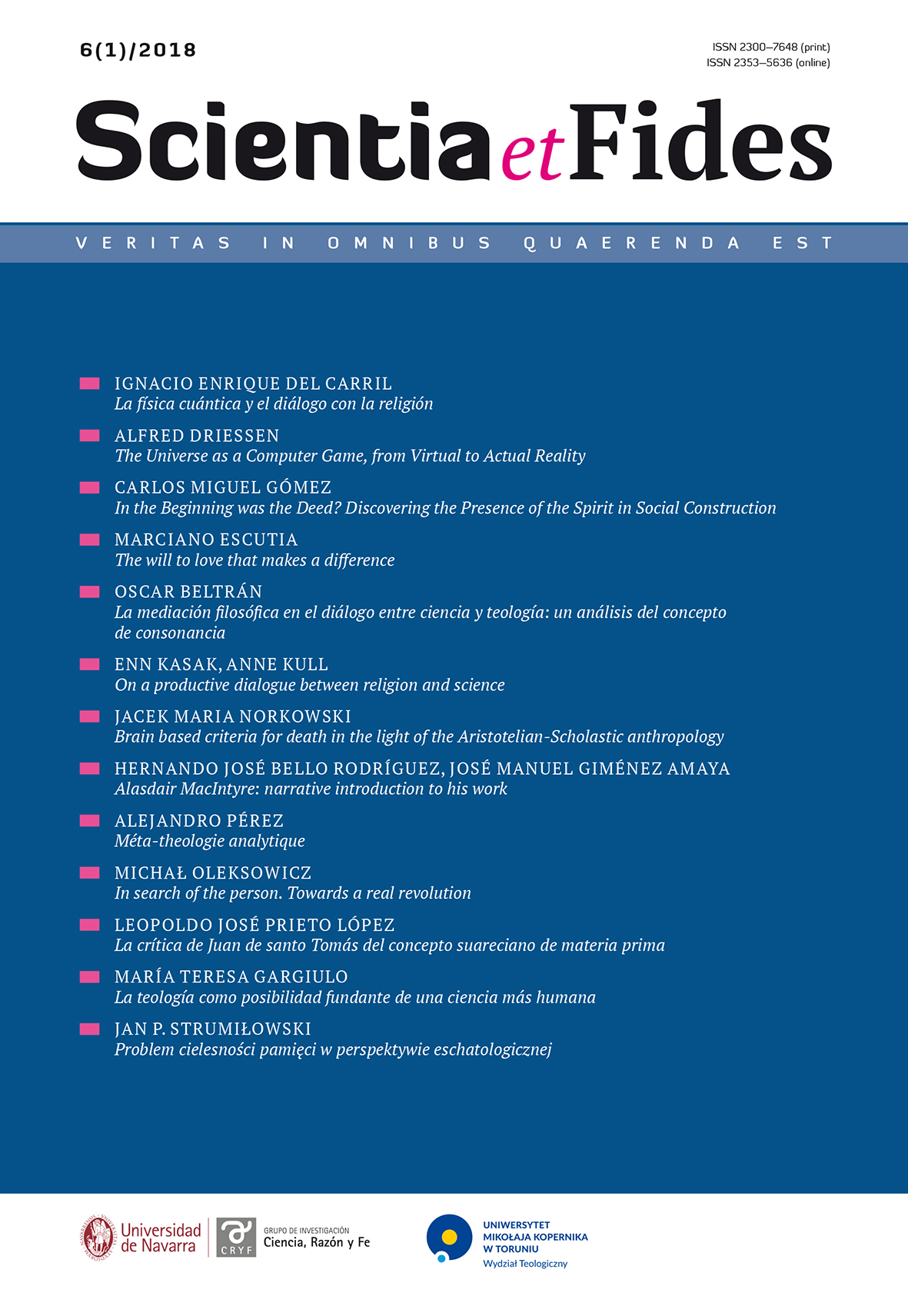La teología como posibilidad fundante de una ciencia más humana
Keywords
Ptolemy, Feyerabend, Human Science, Mathematics, TheologyAbstract
The theology as enabler of a more human science
Paul Karl Feyerabend conceives religion as a possible way to infuse meaning and humanity to the science. He asserts that when it has taken place historically a unity between science and religion, science has been able to transcend values of utility and efficiency. This happens because the religion confers meaning to scientific results within an image of the world that involves the person as a whole. In this context, the Viennese invites to establish a dialogue with the science of ancient Greece in order to know more about more human ways of doing science and to be able to judge in perspective the achievements of scientific materialism. Our objective in this work will be to attend to this invitation of Viennese studying the relation that exists between mathematics and theology in the Ptolemaic writings. We believe that the Alexandrian is an emblematic case of this communion between science and theology and –in this sense– allows us to rethink contemporary science as a cognitive task more attentive to the human and existential implications of its theories and models.
References
Agazzi, Evandro. 1978. Temas y problemas de Filosofía de la Física. Barcelona: Herder.
Barker, Andrew. 1989. Ptolemy “Harmonics”, In Greek Musical Writings II: Harmonic and Acoustic Theory. Cambridge: Cambridge University Press.
Barker, Andrew. 2000. Scientific Method in Ptolemy´s Harmonics. Cambridge: Cambridge University Press.
Boll, Franz. 1894. “Studien uber Claudius Ptolemaus. Jahrbucher fur classische. Philologie, Suppl. 21, p. 218–35.
Bowen, Alan. 1994. Review of Ptolemy´s Universe. The Natural Philosophical and Etical Foundations of Ptolemy´s Astronomy, by Liba Taub, Isis 85, no. 1, p. 141.
Calvo Martínez, Tomás. (Introducción, Traducción y notas). 1998. Aristóteles, Metafísica. Madrid: Gredos.
Candel, Miguel. (Introducción, Traducción y notas). 1996. Aristóteles, Acerca Del Cielo – Meteorologicos. Madrid: Gredos.
Echandía, Guillermo (Introducción, Traducción y notas). 1995. Aristóteles, Física. Madrid: Gredos.
Eggers, Lan. 1986. Platón. Vol. IV: República. Madrid: Gredos.
Feke, Jacqueline. 2009. Ptolemy in Philosophical Context. A Study of the Relationships between Physics, Mathematics, and Theology, Doctor in Philosophy, Institute for the History and Philosophy of Science and technology, University of Toronto.
Feyerabend, Paul. 1981a. “Consolations for the Specialist”. En Problems of Empiricism. Philosophical Papers Volume 2. Cambridge: Cambridge University Press: 131–167.
Feyerabend, Paul. 1981b. “Reply to Criticism. Comments on Smart, Sellars and Putnam.” En Realism, rationalism and scientific method, Philosophical Papers Volume 1. Cambridge: Cambridge University Press: 104–131.
Feyerabend, Paul. 1982. La Ciencia en una Sociedad Libre. Madrid: Veintiuno Editores s.a..
Feyerabend, Paul. 1989. Contra el Método. Esquema de una Teoría Anarquista del Conocimiento. Barcelona: Ariel.
Feyerabend, Paul. 1992. Tratado contra el Método. Esquema de una Teoría Anarquista del Conocimiento. Madrid: Tecnos.
Feyerabend, Paul. 1999a. La Conquista de la Abundancia. La abstracción frente a la riqueza del ser. Barcelona: Paidos.
Feyerabend, Paul. 1999b. “Knowledge without foundation.” En Paul K. Feyerabend: Knowledge, Science and Relativism, Philosophical Papers Volume 3, John Preston (ed.). Cambridge: Cambridge University Press: 50–77.
Feyerabend, Paul. 2003. Provocaciones Filosóficas. Madrid: Editorial Biblioteca Nueva.
Feyerabend, Paul. 20053. Adiós a la Razón. Madrid: Técnos.
Feyerabend, Paul. 2006. “More letters by Paul Feyerabend to Thomas S. Kuhn on Proto Structure.” Hoyningen-Huene P. (ed.). Studies in History and Philosophy of Science 37: 610–632.
Lisi, Francisco (Introducción, Traducción y notas). 1992. Platón. Timeo y Critias. Madrid: Gredos.
Lisi, Francisco (Introducción, Traducción y notas). 1999. Platón. Diálogos. VIII Leyes (Libros I–VI). Madrid: Gredos.
Lisi, Francisco (Introducción, Traducción y notas).1999. Platón. Diálogos. IX Leyes (Libros VII–XII). Madrid: Gredos.
Lloyd, Geoffrey Ernest Richard. 1978. “Saving the Appearances”. The Classical Quarterly, New Series, Vol. 28, No. 1: 202–222.
Long, Anthony Arthur. 1988. “Ptolemy On the Criterion. An epistemology for the practicing scientist” en The Question of Eclecticism, Dillon, J. M. and Long, A.A. (eds.), Studies in later Greek Philosophy, Univ. of California Press: 176–207.
Mínguez, Carlos. 1995. “El Prefacio al Almagesto de Ptolomeo”, Thémata nº 14: 17–35.
Pedersen, Olaf. 2011. A survey of the Almagest: With Annotation and New Commentary by Alexander Jones. Sources and Studies in the History of Mathematics and Physical Sciences. New York: Springer.
Ptolémée. 1956. L'Optique de Claude Ptolémée dans la version latine d'après l'arabe de l'émir Eugène de sicile. Lejeune A. (ed.), Louvain: Université de Louvain. Recueil de travaux d´histoire et de philologie, 4e série, fasc. 8.
Swerdlow, Noel Mark. 2004. "Ptolemy's Harmonics and the 'Tones of the Universe' in the Canobic Inscription,” Studies in the History of the Exact Sciences in Honour of David Pingree. C. Burnett, J. P. Hogendijk, K. Plofker, and M. Yano (eds.), Leiden, p. 137–180.
Taub, Liba Chaia. 1993. Ptolemy´s Universe. The Natural Philosophical and Etical Foundations of Ptolemy´s Universe, Chicago, Open Court Pub.
Toomer, Gerald James (trans.). 1998. Ptolemy’s Almagest, New York: Springer-Verlag.
Downloads
Published
How to Cite
Issue
Section
License
CC BY ND 4.0. The Creator/Contributor is the Licensor, who grants the Licensee a non-exclusive license to use the Work on the fields indicated in the License Agreement.
- The Licensor grants the Licensee a non-exclusive license to use the Work/related rights item specified in § 1 within the following fields: a) recording of Work/related rights item; b) reproduction (multiplication) of Work/related rights item in print and digital technology (e-book, audiobook); c) placing the copies of the multiplied Work/related rights item on the market; d) entering the Work/related rights item to computer memory; e) distribution of the work in electronic version in the open access form on the basis of Creative Commons license (CC BY-ND 3.0) via the digital platform of the Nicolaus Copernicus University Press and file repository of the Nicolaus Copernicus University.
- Usage of the recorded Work by the Licensee within the above fields is not restricted by time, numbers or territory.
- The Licensor grants the license for the Work/related rights item to the Licensee free of charge and for an unspecified period of time.
FULL TEXT License Agreement
Stats
Number of views and downloads: 720
Number of citations: 1



